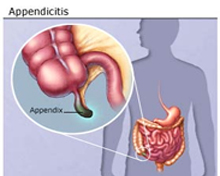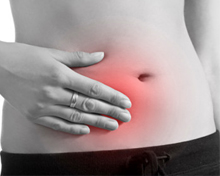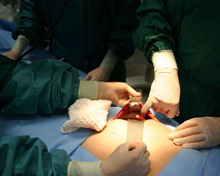Appendicitis is a type of Digestive Diseases

Appendicitis is diagnosed when there is an inflammation of the appendix. The appendix is a small finger-shaped pouch attached to the large intestine and is generally found on the lower right side of the abdomen. This organ of body does not have any function.
Appendicitis creates a medical emergency and doctors have to perform immediate surgery to remove the appendix. If treatment is not given at crisis time, inflamed appendix will ultimately burst, or perforate, spilling infectious materials into the abdominal cavity.
This can lead to peritonitis, a severe inflammation of the abdominal cavity's lining that can be deadly unless it is treated rapidly with strong antibiotics. Sometimes a pus-filled abscess that is an infection that is walled off from the rest of the body forms outside the inflamed appendix. An abscessed appendix is an emergency situation. But it can not be identified without surgery. Due to these facts, cases of appendicitis require surgery.
There is no specific age when appendicitis can occur. But medical data shows that it is uncommon under age 2 and most common between ages 10 and 30. Patients have appendicitis when the appendix becomes blocked, often by stool, a foreign body, or cancer. Obstruction may also occur from infection, since the appendix swells in reaction to any infectivity in the body.
Symptoms
 Patient suffering from Appendicitis exhibit many symptoms that include: Dull pain near the navel or the upper abdomen that becomes intense as it moves to the lower right abdomen.
Patient suffering from Appendicitis exhibit many symptoms that include: Dull pain near the navel or the upper abdomen that becomes intense as it moves to the lower right abdomen.
This is considered as a first sign of appendicitis. Patients feel nausea and/or vomiting soon after abdominal pain begins. There is loss of appetite, abdominal swelling, fever range from 99° F to 102° F, failure to pass gas almost half the time. Other symptoms are sharp pain anywhere in the upper or lower abdomen, back or rectum. Patients feel pain in passing urine.
Patient vomits that go before the abdominal pain. Patients have severe cramps, and complain for constipation or diarrhea with gas. It is advised to patients that they must contact doctor if they have pain with above symptoms. They must not do experiment by eating something, having drinks, or take any pain killer, antacids, laxatives, or heating pads, which can cause an inflamed appendix to rupture. Visit to doctor immediately for timely diagnosis and proper treatment that is very important to get relieve from disease.
Diagnosis
Diagnosis of appendicitis can be difficult because patients show similar symptoms that match with other illness. For example, patients who suffer from gallbladder problems, bladder or urinary tract infection, Crohn's disease, gastritis, intestinal infection and ovary problems show parallel symptoms.
Patient must visit expert medical professional for correct diagnosis. Some tests are frequently done for the diagnosis of appendicitis. There are abdominal exam to detect inflammation, urine test to rule out a urinary tract infection, rectal exam, blood test to observe if body is fighting infection, CT scans and/or ultrasound
Treatment
 For the treatment of appendicitis, surgery is done to remove the appendix, which is termed as an appendectomy in medical language. It is the normal treatment for appendicitis. Antibiotics are prescribed before an appendectomy to fight possible peritonitis. When surgery is done, patient is given general anesthesia and the appendix is removed through a 4-inch incision or by laparoscopy. You can contact Dr. Jameel Akhter who is a Laproscopic Surgeon in Chennai Apollo Hospital.
For the treatment of appendicitis, surgery is done to remove the appendix, which is termed as an appendectomy in medical language. It is the normal treatment for appendicitis. Antibiotics are prescribed before an appendectomy to fight possible peritonitis. When surgery is done, patient is given general anesthesia and the appendix is removed through a 4-inch incision or by laparoscopy. You can contact Dr. Jameel Akhter who is a Laproscopic Surgeon in Chennai Apollo Hospital.
If Patients have peritonitis, the abdomen is also irrigated and drained of pus. After 12 hours of surgery, patients may become conscious. Patients have to be hospitalized for sometime and they can perform normal activities in 2 to 3 weeks. If a laparoscope technique is used to operate the appendix, the cut is smaller and patients recover speedily.
It is very important to take care after operation. After an appendectomy, if patients complain for uncontrolled vomiting, increased pain in abdomen, dizziness/feelings of faintness, blood in vomit or urine, increased pain and redness in cut, fever and pus in the wound, they should immediately call doctor to avoid major complications. All people must understand that appendicitis can not be prevented. It can be said that appendicitis is less common in people who take high fibrous diet such as fresh fruits and vegetables
Articles on Health
- Causes and remedy for dark circles in females

- Harmful impact of mobile phone on unborn baby

- Maternal health care tips

- Rheumatoid Arthritis is Most Widespread in Female
- Periodontal ailment during Pregnancy
- Anemia is prevalent in Women
- Effect of Cell phone tower radiation on human health

- Current health scenario india
- Government health policies india
- Medical facilities india
- Hospital infrastructure india
- Shortage of Medical Professionals in India
- Quality standards indian hospitals
- Indian states health statistics
- Medical expenses india
- Hospitals in Ahmedabad
- Hospitals in Bangalore
- Hospitals in Chennai
- Hospitals in Cochin
- Hospitals in Delhi
- Hospitals in Hyderabad
- Hospitals in Kolkata
- Hospitals in Mumbai
- Hospitals in Pune
- Hospitals in Coimbatore
- Hospitals in Kochi
- Orthopaedics Hospitals in India
- Diabetology Hospitals in India
- Cardiology Hospitals in India
- Infertility Hospitals in India
- Neurology Hospitals in India
- Paediatrics Hospitals in India
- Nephrology Hospitals in India
- Oncology Hospitals in India
- Antiaging foods to improve skin

- Tips for Maintaining healthy bones
- Guidelines for preventing heart disease
- Tips to reduce eye strain while working on computer
- Mental health problems among elderly people
- Health problem of piles

- Health advices for air travel

- Dealing with Allergies
- Tips for Eyes Care
- Care for Crystal Clear Skin
- Tips For Healthy Hair
- Healthy Living is The Absolute Measure of Happiness
- Let Fragrance Rule Your Summer
- Most common vestibular disorder

- Osteoporosis Risk Factors
- Dengue

- Endocrine disorder

- Causes of liver damage
- Dry eye syndrome
- Kidney Stones
- Conjunctivitis: Irritating eye disease
- Anxiety Disorder
- Causes of Brain Damage
- Hepititis B
- Knowledge of Osteoarthritis
- Mental Illness
- Back Pain
- Sugar Addiction
- Diet Control Plans
- General Motors Diet Plan
- No Carbohydrate Diet
- One day Diet Plans
- Seven day diet Plans
- Vegetarian Diet
- Food for Health
- Genetically Modified Foods
- Healing Effects Of Fruits
- Vegetables That Heal
- Healing Effects Of Spices and Herbs
- Test your Stress Level
- Mantras for Relaxation & Stress free life
- Take walk For a healthy body and mind
- Squint is frequently observed in Children
- Consult-Doctor
- Free Handy Health Advice